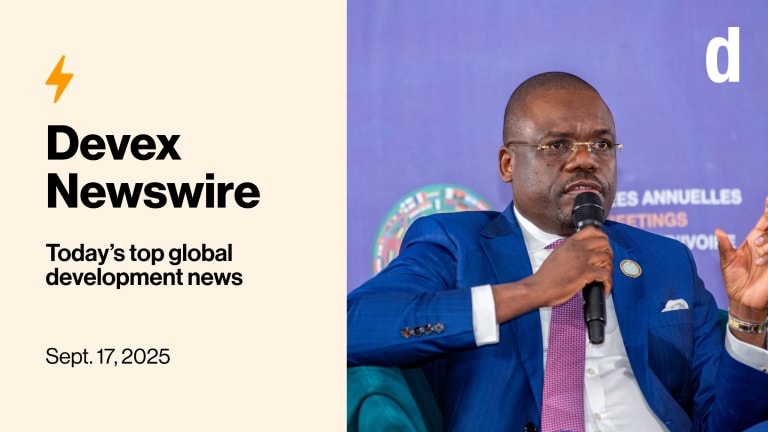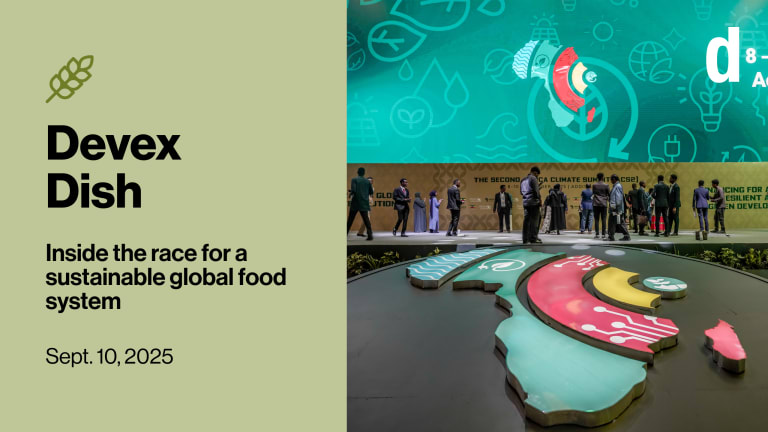A Devex conversation with Africa CDC's Dr. John Nkengasong
Dr. John Nkengasong, director of the Africa Centres for Disease Control and Prevention, and his team use a simple equation when dealing with the numerous challenges that come with responding to the COVID-19 pandemic on the continent.
Sign up for Devex CheckUp
The must-read newsletter for exclusive global health news and insider insights.
“We use a simple equation at Africa CDC: vaccines + vaccinations = lives saved,” he told Devex in an online interview.
Nkengasong said a key challenge facing the continent is getting the vaccinations done in a speedy manner, with a goal of finishing vaccination campaigns in about two years. This year, the goal is to vaccinate about 30% of the African continent’s population.
He said though the COVAX facility represents a great symbol of global cooperation, and the continent is pleased to receive the first wave of vaccines, the facility is designed to achieve 20% coverage, which falls short of the 60% continental target — the level required to achieve herd immunity. He called for a collaborative approach to ensure that the continent is able to acquire the 1.5 billion doses needed to meet this target.
But this collaboration is not without its challenges. Last week several European countries suspended their rollout of the AstraZeneca vaccine — the main vaccine currently being rolled out across the continent — over concerns that the vaccine is linked to blood clotting.
Seventy-eight countries around the world are using the AstraZeneca vaccine, he said. Despite some suspensions in Europe, Nkengasong said the benefits outweigh the risks, and Africa CDC recommends the continued use of the vaccine in Africa. He said a surveillance system is being put in place to monitor post-vaccination events, but added that countries should not roll out the vaccine if the variant originally found in South Africa is dominant in a country, because a study showed the AstraZeneca vaccine was less effective against the strain.
“You would be wasting vaccines, and we don’t have enough vaccines to be wasted,” he said — though he noted that the AstraZeneca vaccine is safe.
Determining if the South African variant is dominant in a country requires extensive tracking of the virus through genomic sequencing.
Nkengasong said the continental goal is to sequence 50,000 genomes by the end of the year to get a full understanding of what is going on in Africa through a regional network of labs that help countries lacking capacity.
He emphasized the need for a strong focus on engagement with populations to ensure these vaccination campaigns are successful, and said “the battle will be fought and won at the community level.”
Looking ahead, Nkengasong added that it is not enough for the continent “to come out of this crisis looking the same as we went into the crisis,” as there is an opportunity to build back better.
Africa went into the pandemic as a continent that imports 99% of its vaccines, he said, unable to develop or produce diagnostics. He encouraged the continent to incentivize continental manufacturing of vaccines and leverage appropriate partnerships in order to change this narrative and come out of the pandemic “looking different and in the spirit of being bold, bigger and better.”
“You do not strengthen health systems when you need them. You strengthen health systems before you need them. So we find ourselves where we are building the ship and riding the ship at the same time, which is not very easy," he said.
Update, March 18, 2021: This article has been updated throughout with comments from the interview.
Search for articles
Most Read
- 1
- 2
- 3
- 4
- 5









